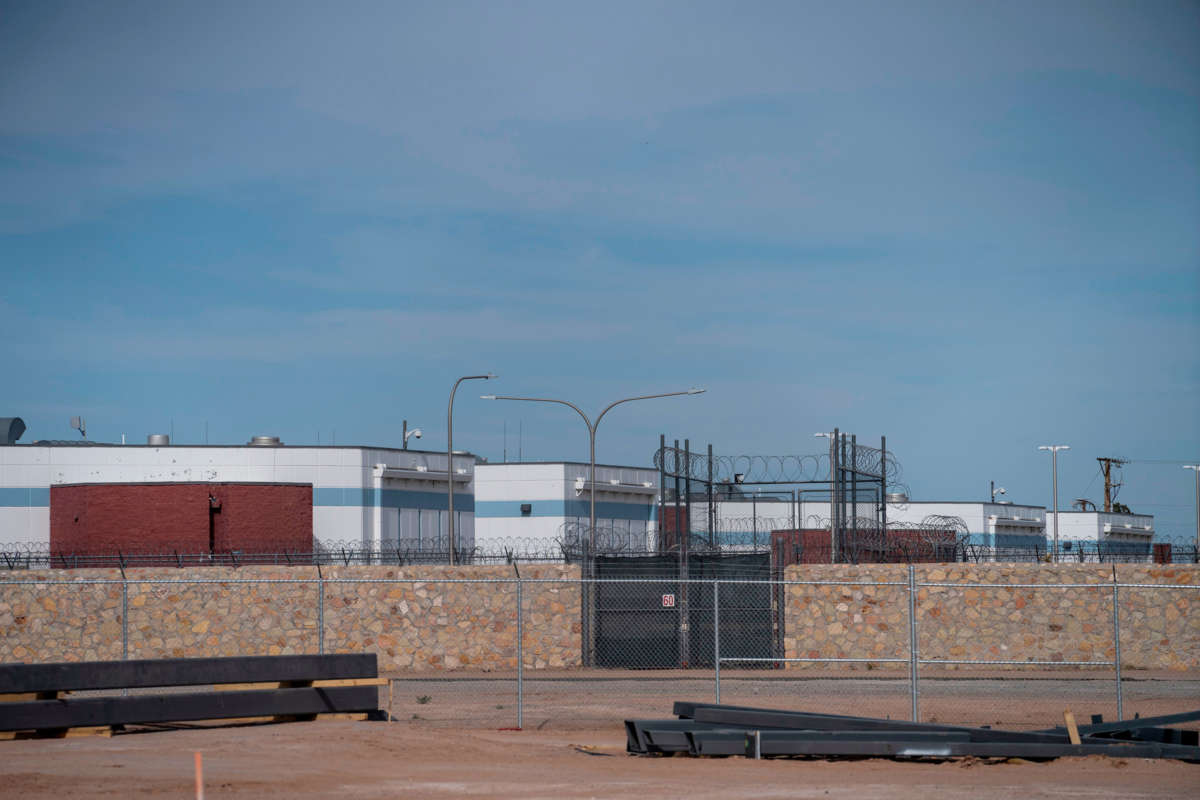Human rights advocates on Tuesday renewed calls for U.S. Immigration and Customs Enforcement to stop force-feeding detained people and end its reliance on mass detention after The Intercept obtained and published footage of a hunger-striking asylum-seeker being force-fed in 2019.
The video depicting nurses forcibly inserting a tube into the nose of Indian asylum-seeker Ajay Kumar in an El Paso, Texas detention center marks the first time the U.S. public has ever seen the federal government force-feed someone, according to The Intercept.
As the outlet notes: “With Ajay Kumar’s consent, The Intercept first requested the video through the Freedom of Information Act in January 2020. After ICE refused their request, The Intercept filed a lawsuit, and ICE subsequently agreed to turn over the footage — after redacting the faces and names of everyone who appears in the video, aside from Kumar’s.”
It was by no means the first, only, or last time ICE officials have carried out involuntary and invasive medical procedures in violation of international law.
A 2021 report by the ACLU and Physicians for Human Rights (PHR) titled Behind Closed Doors: Abuse and Retaliation Against Hunger Strikers in U.S. Immigration Detention details hunger strikes by at least 1,378 people from 74 countries in 62 public and private detention centers in two dozen states from 2013 to 2017, stretching across both the Obama and Trump administrations.
The ACLU-PHR investigation, based on more than 10,000 pages of documents obtained under the Freedom of Information Act, reveals the extent to which ICE responds to hunger strikers not by improving conditions in accordance with prisoners’ demands but by carrying out punitive treatments, including force-feeding, forced hydration, and forced urinary catheterization, among other methods.
“ICE’s horrifying response to peaceful hunger strikes — which are free speech protected by the First Amendment — with coercion and violence continues to expose the cruelty of our immigration detention system,” Eunice Cho, senior staff attorney with the ACLU’s National Prison Project and report co-author, said Tuesday in a statement. “It’s past time to halt this inhumane practice, and ultimately to shut down the ICE detention machine.”
“Respect for patient autonomy is at the heart of medicine,” said Dr. Parveen Parmar, a PHR medical expert and associate professor of Clinical Emergency Medicine at the University of Southern California. “Force-feeding is not only a violation of an individual’s human rights, but a violation of the oath each of us take, as physicians, to respect the rights of those entrusted to our care.”
“The World Medical Association, the American Medical Association, and Physicians for Human Rights have unequivocally stated that force-feeding is in violation of medical ethics,” Parmar continued. “It is high time that ICE and the immigration justice system align with the medical community and outlaw this horrific, painful, and destructive practice in all detention settings.”
Joanna Naples-Mitchell, a research advisor at PHR and co-author of the ACLU-PHR report on hunger strikes in ICE detention, noted that “under international law, force-feeding constitutes cruel, inhuman, or degrading treatment and can rise to the level of torture, violating multiple international human rights treaties.”
“This abhorrent practice is often not possible without the participation or complicity of health professionals,” said Naples-Mitchell.
“Although this chilling footage depicts former President Trump’s Department of Homeland Security, force-feeding continues today under the Biden administration,” she added. “President Biden should seize the opportunity to change course by adopting a new directive on hunger strikes and addressing the underlying cause of so many hunger strikes: an abusive immigration detention system.”
Join us in defending the truth before it’s too late
The future of independent journalism is uncertain, and the consequences of losing it are too grave to ignore. To ensure Truthout remains safe, strong, and free, we need to raise $33,000 in the next 2 days. Every dollar raised goes directly toward the costs of producing news you can trust.
Please give what you can — because by supporting us with a tax-deductible donation, you’re not just preserving a source of news, you’re helping to safeguard what’s left of our democracy.
